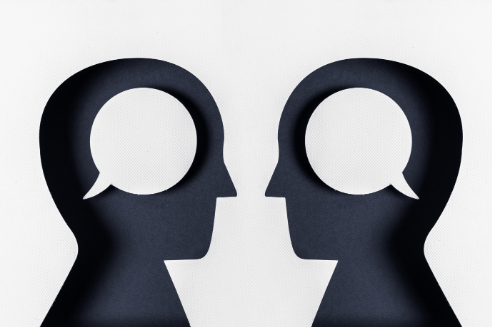“What is the most dangerous word, Olric?”
“‘But, in my opinion, sir.”
“Why Olric?”
“Because it kills every preceding proposition! For instance, ‘I love you, but…’”
One day while scrolling through Twitter, I came across a post. It caught my attention with the above dialogue attributed to the character Olric from Oğuz Atay’s novel Tutunamayanlar (The Disconnected). I did a quick search, but couldn’t find these lines in the mentioned book. Someone had spoken to them and attributed them to Olric, perhaps due to the popularity of the novel. My intention isn’t to criticize the attribution issue in what was written. Despite the absent narrator, I would like to express a truth indicated in the above dialogue, which resonates with my own experience.
Communication is generally facilitated through words, facial expressions, and gestures. Words contribute to conveying meanings. Words and sentences hold great importance in delivering messages during communication. The Hadith “Some eloquent speech is as effective as magic.”[1] reminds us of the significance of how words are used.
Furthermore, the choice of words guides communication. The selected word, after leaving the realm of thought, passes through the filter of the mind. Subsequently, it commands the tongue and vocal cords, resulting in meaningful words. Until a word is vocalized, a person is its master; once it’s uttered, a person becomes a slave to their own speech. Thus, the brilliant minds that surrounded the Luminary of the Universe held firmly to this truth, ensuring they spoke little but with great meaning. The Honorable Umar’s saying, may God be pleased with him, “Excessive speech leads to excessive errors,”[2] prompts us to reflect on this matter.
When speaking, paying maximum attention to chosen words, refraining from using destructive expressions, and making an effort not to hurt the other party are all part of the etiquette of speech. To ensure that a message reaches its recipient in a healthy manner, these etiquette rules need to be observed, tailored to parents, children, bosses, workers, supervisors, interested parties, or loved ones, in short, to the interlocutor. Otherwise, communication problems will arise.
In general, there are words that are used inadvertently and negatively impact communication. One of the most common culprits is the conjunction “but.” While it usually serves to connect sentences, I believe that due to its role within a sentence, it often works as a disjunction. Let me explain this with a few examples.
You’re doing these tasks very well, but it would be better if you did it this way.
I see dedication in your assignments, but it would have been different if you had done them on time.
It’s a great choice that you’ve opted for this job, but you could have found another job as well.
I love you, but this aspect of yours drives me crazy.
The weather is really nice, but it might turn bad soon.
In the above examples, as seen, the conjunction “but” redirects the course of the sentence.
When the conjunction “but” is used with the intention it is meant for, no problem arises; however, if it is used to continue optimistic sentences aimed at encouragement or congratulation, then a problem arises. The part following “but” renders the initial positive expression meaningless. Teun van Dijk points out that people often resort to “but” as a strategic semantic transition to avoid negative self-representation.[3]
Imagine a person who wants to criticize someone for their work. Instead of directly saying it, they start with positive statements. Then, they use “but” to convey what they really want to say.
For instance: “I appreciate the work you’ve done, but it would be better if you gave up.”
In this case, the intention is revealed in the second part of the sentence, but the optimistic phrases preceding “but” frame the sentence as if it were praise. This maneuver can often be detected by some recipients and is not well received.
When congratulating someone, how much better would it be to do so without a “but”? Let’s not sacrifice coherent expressions to “but,” and let’s not unintentionally upset our interlocutors.
The saying attributed to Rumi is also noteworthy: “You are composed of thoughts. You are nothing but flesh and bone. Think of a rose and you become a rose garden. Think of a thorn and you become a thornbush.”[4] Not falling into the trap of turning truths into thorns through the application of “but” requires a bit of effort.
I consider these verses as a prescription for myself. Finally, let’s discuss some advice from mental health counselor Michelle Mooney on the use of “but.” Mooney suggests using “and” instead of “but.” Her advice goes as follows:
“Try to notice how often you use ‘but’ in everyday statements. Now, reframe this section in your mind with ‘and’ and observe the positive difference. Practice with ‘and.’ This will gradually improve your communication and relationships. Here are some examples of saying ‘and’ instead of ‘but’:
‘I appreciate what you’ve done, and if you approached it differently next time, I could assist.’
‘I know you’re tired, and your room also needs cleaning.’
‘I’ve lost five kilos, and I have another ten to go.’”[5]
I can almost hear you replacing the unconscious “buts” with “ands” while reading this. Because during my first reading, I did the same. I believe this stems from my habits, but I also know that I need to make an effort to change them.
I don’t want a loved one to be hurt, their heart to be saddened, or their enthusiasm to be shattered due to a wrongly timed word I used. As the words of the sufferer of our time suggest, considering that the heart, which is a locus of Divine gaze, is esteemed even above the Ka’ba that the Prophet Ibrahim, peace be upon him, constructed, reminds me to refrain from hurting hearts.[6]
[1] Sahih Buhari, Niqah 47; Abu Dawud, Adab 95; Sahih al-Tirmidhi, Edeb 63.
[2] M. Fethullah Gülen, Fikir Atlası (Fasıldan Fasıla-5), İstanbul: Nil Yayınları, 2006, p. 139.
[3] Yusuf Alan, Sözün Gücü, Rotterdam: Libertas Media, 2003, p. 107.
[4] Oğuz Saygın, Sen Düşünceden İbaretsin: Mevlana Işığında Düşünce Yönetimi, İstanbul: Karma Kitaplar, 2012.
[5] “Avoid ‘But’ in Communication – Use ‘And’ Instead”, anchorlighttherapy.com/avoid-but-in-communication-use-and-instead/
[6] M. Fethullah Gülen, “Sarp Yokuşlar ve Merhamet”, Bamteli, 11.02.2018.




